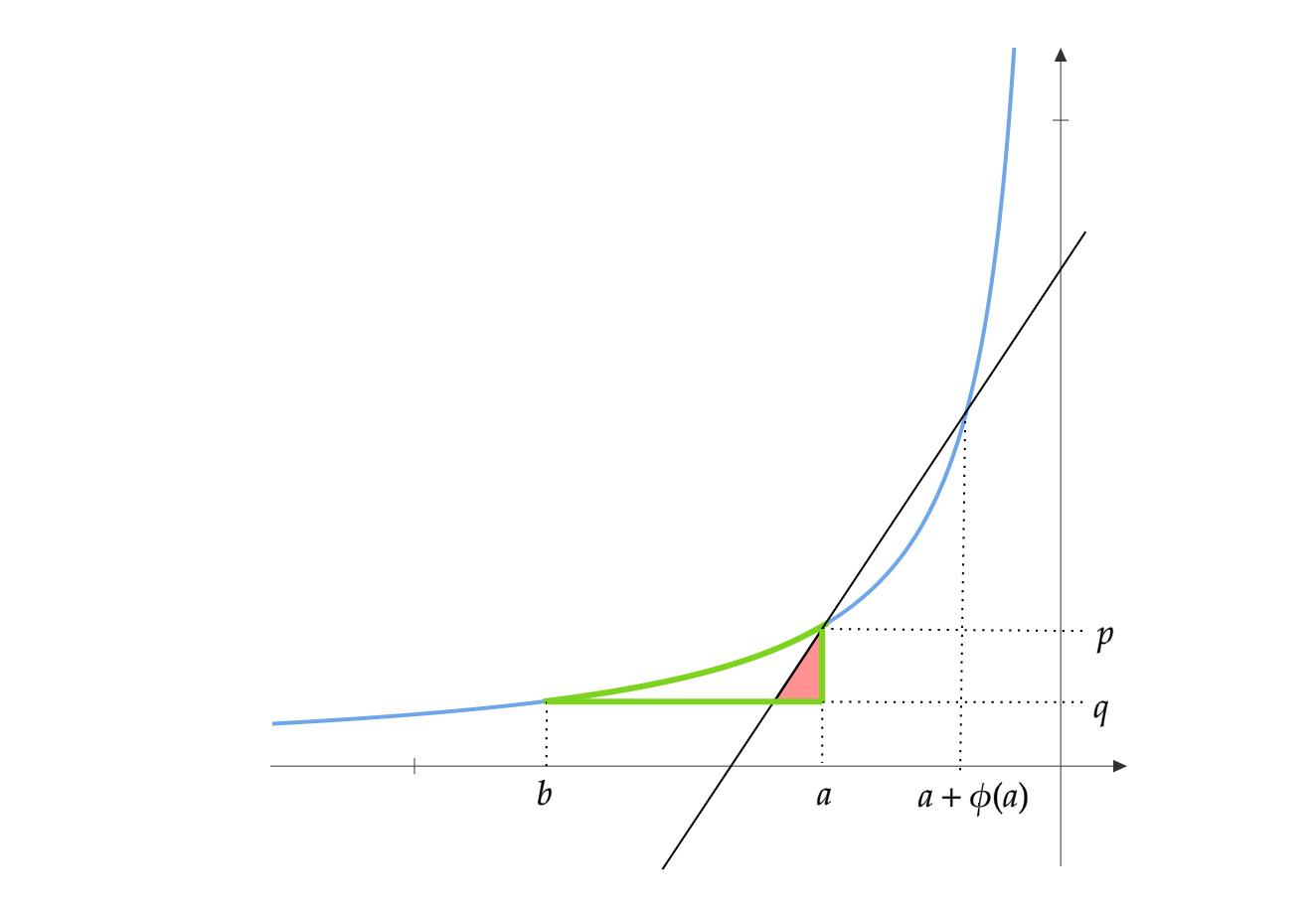An Efron-Stein Like Lower bound for Variance
In a homework of the Machine Learning Theory course that I am taking at UMass, we were asked to prove the Efron-Stein Inequality. It upper bounds the variance of arbitrary functions of iid random variables. While working on the proof, I found an intriguing inequality which has the structure of Efron-Stein, but is a lower bound.
For any function \(f:\mathbb{R}^n\to\mathbb{R}\) and iid random variables \(x_1,..,x_n\)
\[\mathbb{Var}[f(x_1,..,x_n)] \leq \mathbb{E} \sum_{i=1}^n \mathbb{Var}[f(x_1,..,x_n) \mid x_1,..,x_{i-1},x_{i+1},..,x_n]\]Fleshing it out more explicitly:
\[\mathbb{Var}[f] \leq \sum_{i=1}^n \mathbb{E}_{x_1,..,x_{i-1},x_{i+1},..,x_n}[\mathbb{Var}_{x_i}[f \mid x_1,..,x_{i-1},x_{i+1},..,x_n]]\]First, lets try to make the notation more informative and less cumbersome. Let \(\mathbb{E}_{(-i)}\) denote the expectation taken with respect to all variables except \(x_i\). \(\mathbb{E}_{(i)}\) denotes the expectation taken over only \(x_i\). Let \(\mathbb{Var}_{(-i)}\) and \(\mathbb{Var}_{(i)}\) also be defined similarly.
Rephrasing Efron-Stein with slight modification using this notation, we get
\[\mathbb{Var}[f] \leq \sum_{i=1}^n \mathbb{E}_{(-i)}[\mathbb{Var}_{(i)}[f]]\]Law of Total Variance: \(\mathbb{Var}[Y] = \mathbb{E}[\mathbb{Var}[Y\mid X]] + \mathbb{Var}[\mathbb{E}[Y\mid X]]\)
We can use the Law of Total Variance to express \(\mathbb{Var}[f]\) in \(n\) was.
\[\mathbb{Var}[f] = \mathbb{Var}_{(-i)}[\mathbb{E}_{(i)}[f]] + \mathbb{E}_{(-i)}[\mathbb{Var}_{(i)}[f]] \quad \text{ for all } i \in [n]\]Taking the sum over all \(n\) ways of expressing \(\mathbb{Var}[f]\), we get
\[\begin{align} n\mathbb{Var}[f] &= \sum_{i=1}^n\mathbb{Var}_{(-i)}[\mathbb{E}_{(i)}[f]] + \sum_{i=1}^n\mathbb{E}_{(-i)}[\mathbb{Var}_{(i)}[f]]\\ &\geq \sum_{i=1}^n\mathbb{Var}_{(-i)}[\mathbb{E}_{(i)}[f]] + \mathbb{Var}[f] \end{align}\]The inequality is obtained by applying Efron-Stein to the second summation. This give us the final result.
\[\boxed{\mathbb{Var}[f] \geq \frac{1}{n-1} \sum_{i=1}^n\mathbb{Var}_{(-i)}[\mathbb{E}_{(i)}[f]]}\]Re-writing using more commonly used notation.
\[\boxed{\mathbb{Var}[f] \geq \frac{1}{n-1} \sum_{i=1}^n\mathbb{Var}_{x_1,..x_{i-1},x_{i+1},..x_n}[\mathbb{E}_{x_i}[f \mid x_1,..x_{i-1},x_{i+1},..x_n]]}\]This inequality is quite similar to Efron-Stein. Just interchange \(\mathbb{Var}\) with \(\mathbb{E}\) on the left, change \(\leq\) to \(\geq\) and scale by \(1/(n-1)\).
This inequality is also tight. Consider \(f = \sum_{i=1}^n x_i\) where \(x_i\) are drawn iid from a distribution with mean \(\mu\) and variance \(\sigma^2\).
On the LHS, \(\mathbb{Var}[f]=n\sigma^2\)
On the RHS,
\[\begin{align} \mathbb{Var}_{(-i)}[\mathbb{E}_{(i)}[f]]&= \mathbb{Var}_{(-i)}[x_1+..x_{i-1}+\mu+x_{i+1}+..+x_n]\\ &= (n-1)\sigma^2\\ \frac{1}{n-1} \sum_{i=1}^n\mathbb{Var}_{(-i)}[\mathbb{E}_{(i)}[f]]&= \frac{1}{n-1} n(n-1)\sigma^2 = n\sigma^2 \end{align}\]So far, I haven’t seen this inequality in any text or paper. If no else has seen it and it is new, then \(\text{YAY!}\) Otherwise \({}_\text{yay!}\). Hopefully some statistician or researcher can tell me if its a known result. Or better yet, uses it for their work.
Follow up post containing a more elegant result:A Family of Efron-Stein Like Lower bounds for Variance.
